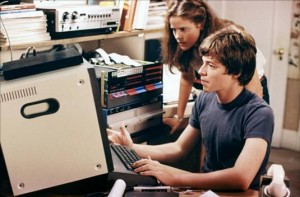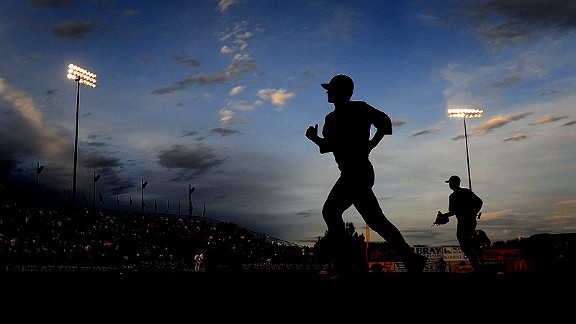Chad Billingsley gave up a single to the first batter he faced today, Arizona infielder Ryan Roberts. It came on a 1-2 pitch. You never want to see that happen, though it’s easily forgiven if it comes on your pitch. Billingsley, instead, left a fastball over the plate and chest-high. Roberts grounded it to the left of shortstop Dee Gordon into center field. With a little luck, Roberts would have hit it a few feet over, into Gordon’s range. But there was as much luck for Billingsley as there was execution.
“Normally,” said Dodger commentator Rick Monday, “in your last outing in Arizona for Spring Training, you would say, ‘Well, it’s just a final tuneup.’ I really believe that for Chad Billingsley, this is more than just a final tuneup, because he has not been fine-tuned so far. And since this is his last outing, I think it’s imperative to get some batters behind in the count, as he had right here the leadoff hitter Roberts, (and) finish them off.”
“Imperative” would be an exaggeration – nothing’s imperative until at least the regular season starts. But shy of that, Monday’s overall point wasn’t lost. You want to see it done right.
Billingsley did do some things right – after walking Justin Upton with one out, he struck out Jason Kubel to start an inning-ending double play that found Aaron Hill (who had hit into a 9-6 bloop forceout) caught stealing by A.J. Ellis. Billingsley then struck out his first batter of inning two, Chris Young. But mostly, it was a rough outing – insufficiently sharp. The 27-year-old righty gave up four runs and six hits on 70 pitches in three innings, including two arguably wind-aided home runs to left field. He finished his 2012 exhibition season with a 5.91 ERA.
Monday was fairly relentless in his criticism of Billingsley throughout the three innings, and again, I was of two minds. The critique seemed a bit over the top for a practice game, even with the regular season coming later this week. At the same time, unless Billingsley was deliberately trying to hide his good stuff from his division, it was a hard outing to watch, both from individual and team standpoints.
I’m still wondering if the poor performance by Billingsley in the second half of 2011, following a solid first two months, was injury-related. I might never get the answer. But one scenario that certainly is possible is that Billingsley’s 2012 effectively becomes a repeat of Jonathan Broxton’s 2011. Problems from the second half of the previous season are never really solved, and the ensuing campaign becomes a lost one.
Without minimizing what this might mean for Billingsley’s career, it points to the cliff’s edge the Dodgers will be driving along in 2012. They’re counting on improvement from players like Billingsley, Andre Ethier (having the best kind of Spring Training) and James Loney. If those players instead take additional steps back, you’re basically left with asking the farm system (Nathan Eovaldi, Jerry Sands, etc.) to come to the rescue. They might succeed, just as Javy Guerra did for Broxton in 2011, but it’s a risky business.
That Clayton Kershaw had an uneven performance 24 hours before Billingsley, allowing three runs on six hits and a walk in 3 2/3 innings, offers a half-empty, half-full counterpoint. From Tony Jackson of ESPNLosAngeles.com:
… Kershaw said he was missing his spots and that his slider, which he had struggled with in his previous start six days earlier, still wasn’t quite right. But when asked if the slider was a concern now that the regular season is upon him, Kershaw said it isn’t.
“It can’t be,” he said. “April 5 is coming up pretty fast. You have to be ready to go.”
Dodgers pitching coach Rick Honeycutt says he continues to see good sliders from Kershaw intermittently, but that the inconsistency could be the result of Kershaw trying to force the pitch, especially in light desert air where breaking balls tend not to break as much and where simply getting a proper grip on the ball can be tough.
“But he isn’t going to make that excuse, and I’m not going to make it for him,” Honeycutt said. “As long as he is healthy, that is the main thing. [The slider] isn’t something I’m worried about. He is going to continue to work on it until he feels comfortable with it.” …
Whatever the results of March 2012, hoping that Matt Kemp, Kershaw, Billingsley, Ethier and Loney perform to their previous peaks isn’t exactly the longshot of picking a MegaMillions jackpot. It could happen, and if it does, I wouldn’t call it a fluke – just good timing. That, plus new ownership itching to make a first impression, plus my perhaps irrational belief that Gordon is going to excite all expectations (“I’m a Deeliever,” I’ve started singing to myself), plus an awareness that other teams in the NL aren’t blessed with unlimited good fortune, is why I enter this season with the hope that the Dodgers can win at least 90 games and a spot in postseason roulette.
But the lack of Plan Bs makes the Dodgers’ 2012 season a perilous one, with 90 losses anything but a remote possibility. If Billingsley struggles, if Ted Lilly can’t stay healthy, if Juan Uribe is toast, if Kemp and Kershaw take perfectly reasonable steps back from their insane greatness of last year, and so on into the night, the Dodgers quickly run out of escape routes.
At the end, it all comes back to the beginning. You’re on the mound. You have a 1-2 count on the batter. You have talent, experience and an edge.
Can you make your pitch?
Can your defense save you when you don’t?
Can your offense save you when your defense doesn’t?
Can your management save you when your offense and defense can’t?






